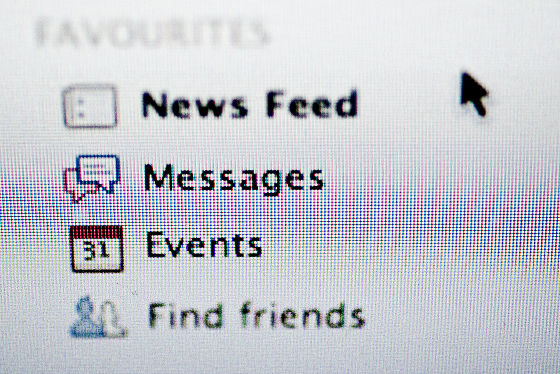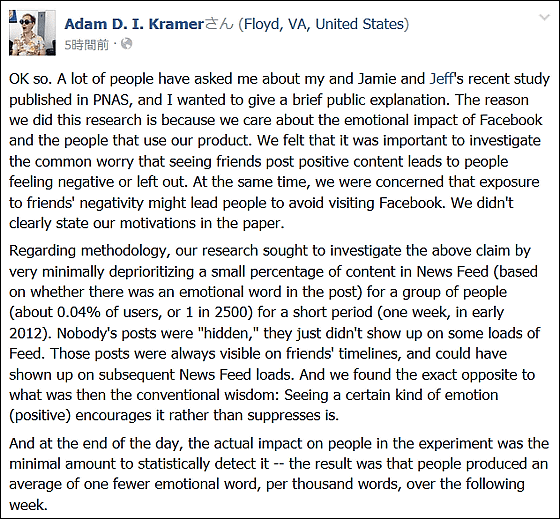Facebook officially apologizes for psychological experiments of emotional infection without user's permission

ByMkhmarketing
Facebook will be on June 2, 2014 by the American Academy of Sciences "PNAS"To manipulate the user's newsfeedEmotional infectionI posted a paper that carried out psychological experiments, but since I was carrying out experiments without notifying the user to the user, there was a voice saying "Is there a moral problem?" Facebook officially expressed an apology about psychological experiments and explains the reasons for doing experiments.
OK so. A lot of people have asked me ... - Adam D. I. Kramer
https://www.facebook.com/akramer/posts/10152987150867796
Experimental evidence of massive-scale emotional contagion through social networks
http://www.pnas.org/content/111/24/8788.full
Even the Editor of Facebook's Mood Study Thought It Was Creepy - Adrienne LaFrance - The Atlantic
http://www.theatlantic.com/technology/archive/2014/06/even-the-editor-of-facebooks-mood-study-thought-it-was-creepy/373649/
Experiments conducted on 680,900 Facebook users who use English, said, "If you control the target user's newsfeed to reduce the display of posts that contain positive or negative words, what about posting by users? Whether the influence comes out "in the psychological termEmotional infectionIt was about things.
According to Facebook papers posted on PNAS, users' postings with reduced positive word display include negative words more frequently, while users posted with negative words decreased The number of times that positive words are included increases, and it says, "It was proved that emotional infections also occurred in SNS."

ByMixy Lorenzo
In the United States, institutions such as universities that receive subsidies from the government, when conducting experiments involving humansClinical trial review committeeIt is necessary to get permission from the examination of one of the guidelines. One of the guidelines is "to conduct experiments, you must obtain permission from the subject before starting the experiment". Susan Fisk of Princeton University psychology professor who was in charge of editing Facebook papers on PNAS's posting said, "Because Facebook is a private company, it is not necessary to obtain permission from the trial review committee like university, but many Private enterprises voluntarily observe the guidelines established by the examination review committee.In experiments involving many people, the subjects have the right to decide whether to agree to participate in experiments before receiving the explanation about the experiment before implementation There is concern about Facebook's attitude. "
In response to opinions like Mr. Fisk, he is the author of the paperAdam KramerHe made an official explanation on his Facebook page on June 29th. Kramer said, "We were concerned about the influence of the emotions Facebook had on users, such as whether a user who saw a post that a friend is making happy has negative emotions, etc. , There was also concern that users who had a negative emotion from a friend's post will not use Facebook, "explained the reasons for the experiment.

In addition, Mr. Kramer said that "For making Facebook better service, it was not to confuse the user," he says, "Because I did not write the purpose of the experiment clearly in the thesis, I am sorry about confusing the user, "but I apologized for Mr. Fisk's concern about" doing experiments without user's permission "that I was worried about .
According to Mr. Kramer, this experiment was conducted in 2012 and many things learned from the experimental response are to be reflected in the examination standards of internal organizations examining the experiment.
Related Posts:
in Web Service, Posted by darkhorse_log







